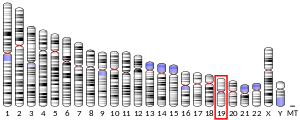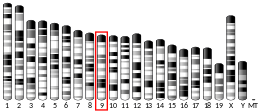PPAN
Suppressor of SWI4 1 homolog is a protein that in humans is encoded by the PPAN gene.[5][6]
| PPAN | |||||||||||||||||||||||||
|---|---|---|---|---|---|---|---|---|---|---|---|---|---|---|---|---|---|---|---|---|---|---|---|---|---|
| Identifiers | |||||||||||||||||||||||||
| Aliases | PPAN, BXDC3, SSF, SSF-1, SSF1, SSF2, peter pan homolog (Drosophila), peter pan homolog | ||||||||||||||||||||||||
| External IDs | OMIM: 607793 MGI: 2178445 HomoloGene: 5690 GeneCards: PPAN | ||||||||||||||||||||||||
| |||||||||||||||||||||||||
| |||||||||||||||||||||||||
| |||||||||||||||||||||||||
| Orthologs | |||||||||||||||||||||||||
| Species | Human | Mouse | |||||||||||||||||||||||
| Entrez | |||||||||||||||||||||||||
| Ensembl | |||||||||||||||||||||||||
| UniProt | |||||||||||||||||||||||||
| RefSeq (mRNA) | |||||||||||||||||||||||||
| RefSeq (protein) | |||||||||||||||||||||||||
| Location (UCSC) | Chr 19: 10.11 – 10.11 Mb | Chr 9: 20.89 – 20.89 Mb | |||||||||||||||||||||||
| PubMed search | [3] | [4] | |||||||||||||||||||||||
| Wikidata | |||||||||||||||||||||||||
| |||||||||||||||||||||||||
The protein encoded by this gene is an evolutionarily conserved protein similar to yeast SSF1 as well as to the gene product of the Drosophila gene peter pan (PPAN). SSF1 is known to be involved in the second step of mRNA splicing. Both SSF1 and PPAN are essential for cell growth and proliferation. This gene was found to cotranscript with P2RY11/P2Y(11), an immediate downstream gene on the chromosome that encodes an ATP receptor. The chimeric transcripts of this gene and P2RY11 were found to be ubiquitously present and regulated during granulocytic differentiation. Exogenous expression of this gene was reported to reduce the anchorage-independent growth of some tumor cells.[6]
One of the introns of PPAN encodes the Small nucleolar RNA SNORD105.[7]
References
- GRCh38: Ensembl release 89: ENSG00000130810 - Ensembl, May 2017
- GRCm38: Ensembl release 89: ENSMUSG00000004100 - Ensembl, May 2017
- "Human PubMed Reference:". National Center for Biotechnology Information, U.S. National Library of Medicine.
- "Mouse PubMed Reference:". National Center for Biotechnology Information, U.S. National Library of Medicine.
- Welch PJ, Marcusson EG, Li QX, Beger C, Kruger M, Zhou C, Leavitt M, Wong-Staal F, Barber JR (Sep 2000). "Identification and validation of a gene involved in anchorage-independent cell growth control using a library of randomized hairpin ribozymes". Genomics. 66 (3): 274–83. doi:10.1006/geno.2000.6230. PMID 10873382.
- "Entrez Gene: PPAN peter pan homolog (Drosophila)".
- Vitali, P; Royo H; Seitz H; Bachellerie JP; Huttenhofer A; Cavaille J (2003). "Identification of 13 novel human modification guide RNAs". Nucleic Acids Res. 31 (22): 6543–6551. doi:10.1093/nar/gkg849. PMC 275545. PMID 14602913.
Further reading
- Communi D, Govaerts C, Parmentier M, Boeynaems JM (1998). "Cloning of a human purinergic P2Y receptor coupled to phospholipase C and adenylyl cyclase". J. Biol. Chem. 272 (51): 31969–73. doi:10.1074/jbc.272.51.31969. PMID 9405388.
- Migeon JC, Garfinkel MS, Edgar BA (1999). "Cloning and characterization of peter pan, a novel Drosophila gene required for larval growth". Mol. Biol. Cell. 10 (6): 1733–44. doi:10.1091/mbc.10.6.1733. PMC 25365. PMID 10359593.
- Suarez-Huerta N, Boeynaems JM, Communi D (2000). "Cloning, genomic organization, and tissue distribution of human Ssf-1". Biochem. Biophys. Res. Commun. 275 (1): 37–42. doi:10.1006/bbrc.2000.3259. PMID 10944437.
- Communi D, Suarez-Huerta N, Dussossoy D, et al. (2001). "Cotranscription and intergenic splicing of human P2Y11 and SSF1 genes". J. Biol. Chem. 276 (19): 16561–6. doi:10.1074/jbc.M009609200. PMID 11278528.
- Andersen JS, Lyon CE, Fox AH, et al. (2002). "Directed proteomic analysis of the human nucleolus". Curr. Biol. 12 (1): 1–11. doi:10.1016/S0960-9822(01)00650-9. PMID 11790298.
- Duhant X, Schandené L, Bruyns C, et al. (2002). "Extracellular adenine nucleotides inhibit the activation of human CD4+ T lymphocytes". J. Immunol. 169 (1): 15–21. doi:10.4049/jimmunol.169.1.15. PMID 12077223.
- Scherl A, Couté Y, Déon C, et al. (2003). "Functional proteomic analysis of human nucleolus". Mol. Biol. Cell. 13 (11): 4100–9. doi:10.1091/mbc.E02-05-0271. PMC 133617. PMID 12429849.
- Strausberg RL, Feingold EA, Grouse LH, et al. (2003). "Generation and initial analysis of more than 15,000 full-length human and mouse cDNA sequences". Proc. Natl. Acad. Sci. U.S.A. 99 (26): 16899–903. doi:10.1073/pnas.242603899. PMC 139241. PMID 12477932.
- Beausoleil SA, Jedrychowski M, Schwartz D, et al. (2004). "Large-scale characterization of HeLa cell nuclear phosphoproteins". Proc. Natl. Acad. Sci. U.S.A. 101 (33): 12130–5. doi:10.1073/pnas.0404720101. PMC 514446. PMID 15302935.
- Gerhard DS, Wagner L, Feingold EA, et al. (2004). "The status, quality, and expansion of the NIH full-length cDNA project: the Mammalian Gene Collection (MGC)". Genome Res. 14 (10B): 2121–7. doi:10.1101/gr.2596504. PMC 528928. PMID 15489334.
- Nousiainen M, Silljé HH, Sauer G, et al. (2006). "Phosphoproteome analysis of the human mitotic spindle". Proc. Natl. Acad. Sci. U.S.A. 103 (14): 5391–6. doi:10.1073/pnas.0507066103. PMC 1459365. PMID 16565220.
- Beausoleil SA, Villén J, Gerber SA, et al. (2006). "A probability-based approach for high-throughput protein phosphorylation analysis and site localization". Nat. Biotechnol. 24 (10): 1285–92. doi:10.1038/nbt1240. PMID 16964243.
- Olsen JV, Blagoev B, Gnad F, et al. (2006). "Global, in vivo, and site-specific phosphorylation dynamics in signaling networks". Cell. 127 (3): 635–48. doi:10.1016/j.cell.2006.09.026. PMID 17081983.
- Ewing RM, Chu P, Elisma F, et al. (2007). "Large-scale mapping of human protein-protein interactions by mass spectrometry". Mol. Syst. Biol. 3 (1): 89. doi:10.1038/msb4100134. PMC 1847948. PMID 17353931.



